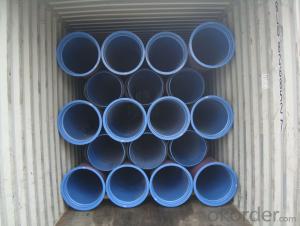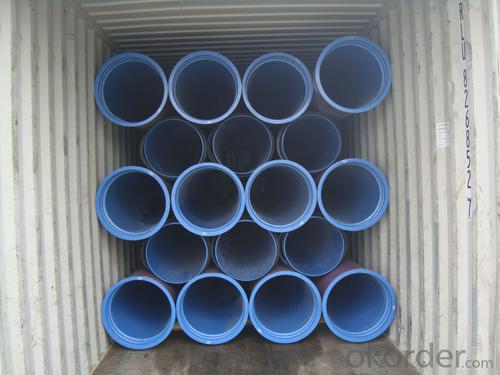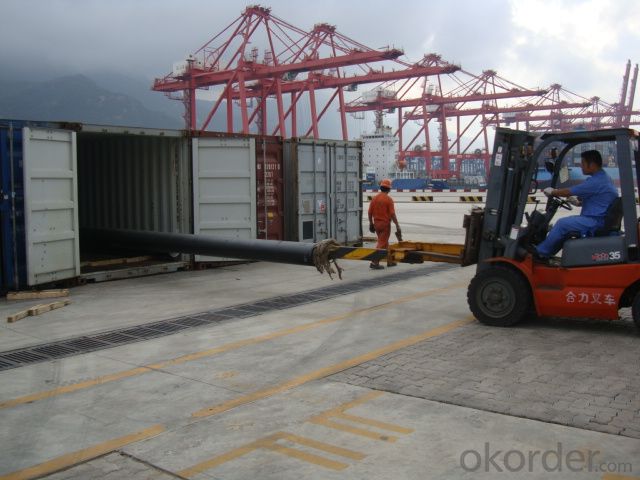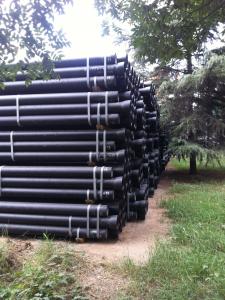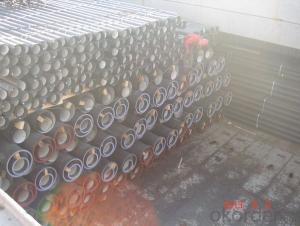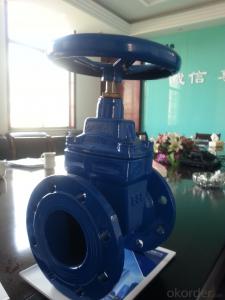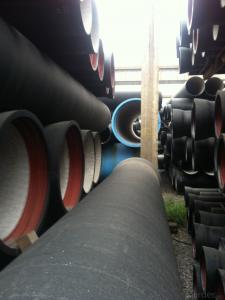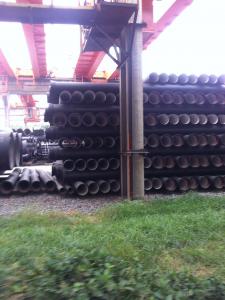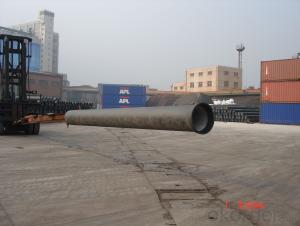DUCTILE IRON PIPES AND PIPE FITTINGS K8 CLASS DN100
- Loading Port:
- Tianjin
- Payment Terms:
- TT OR LC
- Min Order Qty:
- 22 pc
- Supply Capability:
- 3000 pc/month
OKorder Service Pledge
OKorder Financial Service
You Might Also Like
Material : Ductile Cast Iron
Size Range : DN 80mm to DN 2000mm
Unit Effective Length : 6m or 5.7m
Manufacture Standard: ISO 2531:1998/ EN 545:2006/EN 598:2007
Annual capacity : 200,000 tons
Coating Exterior: Zinc 130g/m2 according to ISO 8179-1 and bitumen coating 70 microns.
Cement Interior: Portland Cement/ High Alumina Cement/ Sulphate Resisting Cement Lining according to ISO 4179
Special requirements on external coating and internal lining can be applied
We also provide accessories such as SBR/EPDM rubber gaskets, lubricant paste, pipe caps, PE sleeves, etc.
Additional Parts:
Each pipe is strictly inspected according to related standard to ensure permanently high performance.
Easy Installation at site and service free for life
Long Service Lifespan
Quotation will arrive you within 24hours once we get your inquiry.
We guarantee offering you a competitive price.
A copy of original inspection reports of pipes will be offered after shipment.
Photos of loading process will be sent to the customer after shipment effect.
We will follow-up the delivery progress after shipment effect and update to the customer on weekly basis.
- Q: How are ductile iron pipes protected against internal scaling or buildup?
- Various methods are utilized to protect ductile iron pipes against internal scaling or buildup. One widely employed technique involves applying a cement mortar lining to the inner surface of the pipes. This lining serves as a protective barrier, preventing the formation of scale or buildup and facilitating the smooth flow of water or other fluids. Moreover, an additional layer of polyethylene or other appropriate materials can be coated onto the pipes to provide an extra level of protection against scaling or buildup. This coating acts as a barrier between the water and the iron surface, thereby reducing the likelihood of corrosion or scale formation. Regular maintenance and cleaning play a crucial role in preventing internal scaling or buildup in ductile iron pipes. By flushing the pipes with high-pressure water or employing chemical treatments, any accumulated scale or debris can be effectively removed, ensuring the pipes remain clean and fully functional. Furthermore, proper water treatment is essential in minimizing the risk of scaling or buildup. By implementing suitable water treatment processes, such as pH adjustment or the use of corrosion inhibitors, the quality of the water can be maintained, preventing the formation of scale or buildup inside the pipes. In conclusion, various measures, including cement mortar lining, pipe coating, regular maintenance, cleaning, and proper water treatment, are employed to protect ductile iron pipes against internal scaling or buildup. These measures ensure the longevity and efficiency of the pipes, minimizing the chances of clogging or reduced flow capacity.
- Q: What is the difference between ductile iron pipes and cast iron pipes?
- Ductile iron pipes and cast iron pipes differ in terms of their composition and physical properties. Ductile iron pipes are made from ductile iron, which is a type of cast iron that contains nodular graphite in its microstructure, making it more flexible and resistant to cracking. On the other hand, cast iron pipes are made from gray cast iron, which has a gray, brittle structure due to the presence of graphite flakes. Ductile iron pipes are stronger, more durable, and less prone to damage, making them suitable for high-pressure applications and areas with heavy traffic loads. Cast iron pipes, although more brittle, are known for their corrosion resistance and are commonly used for water and sewage systems.
- Q: Can ductile iron pipe be used for industrial process piping?
- Indeed, industrial process piping can make use of ductile iron pipe. Renowned for its robustness, longevity, and ability to withstand corrosion, ductile iron pipe proves itself as an appropriate selection for diverse industrial functions. It boasts the capability to manage high-pressure systems and commonly finds application in sectors like water and wastewater treatment, oil and gas, chemical processing, and power generation. Moreover, ductile iron pipe offers ease of installation and an extensive lifespan, thus rendering it a cost-efficient choice for industrial process piping.
- Q: What is the expected hydraulic efficiency of ductile iron pipes?
- The expected hydraulic efficiency of ductile iron pipes is generally high, as they have a smooth interior surface that minimizes friction and allows for efficient flow of water or other fluids.
- Q: How does ductile iron pipe handle soil movement?
- Ductile iron pipe possesses exceptional strength and durability, making it highly effective in managing soil movement. When the surrounding soil shifts or settles, ductile iron pipes can flex and adapt to this movement without compromising their structural integrity. The ability of ductile iron pipes to handle soil movement stems from their inherent capacity to endure bending and stretching. They have a remarkable level of flexibility, allowing them to adjust to ground shifts and settle without experiencing any breakage or cracks. This flexibility arises from the distinctive material properties of ductile iron, a type of cast iron that has been treated with magnesium to enhance its strength and elasticity. Furthermore, ductile iron pipes are constructed with a thick wall, which enhances their resistance against soil movement. This robust construction assists in distributing the forces exerted by the shifting soil, minimizing the impact on the pipe and preventing significant damage. Moreover, ductile iron pipes are typically installed with suitable bedding and backfill materials to provide additional support and stability. This involves using compacted soil or engineered granular materials around the pipe, which helps evenly distribute the load and reduces the potential for soil movement. Overall, ductile iron pipe is an excellent choice for areas with high soil movement, such as regions with expansive or unstable soils. Its flexibility, strength, and proper installation techniques enable it to effectively handle the challenges presented by soil movement, ensuring long-lasting and dependable performance in various applications.
- Q: Qianwei County ductile iron pipe which tool to use cutting convenience?
- Cutting the ductile iron pipe by grinding is grinding and cutting the ductile iron tube continuously by grinding wheel until it breaks. To cut ductile iron pipes by grinding cutting method, the cutting parts should be crossed at first so as to avoid deviation during cutting. Place the drawn ductile iron tube in the cutting machine and fix the ductile iron tube and clamp it with a built-in clamp. Next, start the cutting machine and gradually press the handle of the cutting machine. The grinding wheel cuts into the ductile iron tube until the ductile iron pipe is cut off. When exerting pressure on the handle, do not force too hard at once, otherwise it will cause the grinding wheel to break. In the operation of the machine, the operator must not stand on the side of the grinding wheel, so as to avoid accidents. When the wheel appears in cutting, vibration, shaking, uneven phenomenon, should immediately stop the operation, check whether there is the wheel gap, if damaged, must be promptly replaced, to ensure safety and normal. Good cutting ductile cast iron pipe section, if there is to prevent the use of burrs, can be removed by grinding or machining file.
- Q: Are there any special considerations for installing ductile iron pipe in rocky soils?
- Yes, there are several special considerations for installing ductile iron pipe in rocky soils. Firstly, the rocky soil can pose challenges during the excavation process. The presence of rocks can increase the difficulty and time required for trenching. Special excavation equipment may be needed to break through the rocks and create a suitable trench for the pipe installation. Secondly, the rocky soil can cause abrasion and damage to the outer surface of the ductile iron pipe during installation. This can potentially compromise the integrity of the pipe and lead to leaks or breakages in the future. To mitigate this risk, it is recommended to use protective measures such as rock shields or padding around the pipe to minimize direct contact with the rocks. Additionally, the presence of rocks can affect the backfilling process. Proper backfilling is crucial to provide support and stability to the installed pipe. However, rocks can hinder the proper compaction of the backfill material, which may result in uneven support and potential movement of the pipe. It is important to carefully select and place the backfill material, ensuring it is free from larger rocks and adequately compacted to provide sufficient support. Furthermore, the rocky soil may also impact the installation of fittings and joints. The hard rocks can make it challenging to properly align and connect the pipe with fittings or make secure joints. Special care must be taken during the installation process to ensure proper alignment and secure connections, which will prevent leaks and ensure the longevity of the ductile iron pipe system. In conclusion, installing ductile iron pipe in rocky soils requires special considerations to overcome challenges related to excavation, abrasion, backfilling, and fitting installation. By taking these factors into account and implementing appropriate measures, the installation process can be successfully carried out, and the pipe system can function effectively in rocky soil conditions.
- Q: Are ductile iron pipes suitable for underground installations?
- Ductile iron pipes are well-suited for underground installations. They are made from a highly sturdy and durable material that can handle the various pressures and strains commonly found in underground environments. Moreover, they possess exceptional resistance to corrosion, which makes them an excellent choice for underground applications that might expose them to moisture, soil, and other corrosive elements. Additionally, these pipes have a high tensile strength, enabling them to withstand external loads and prevent cracking or breakage caused by ground movement or heavy traffic. Furthermore, ductile iron pipes have a longer lifespan compared to other materials, making them a cost-effective option for underground installations. On the whole, ductile iron pipes are a dependable and appropriate choice for underground applications because of their durability, corrosion resistance, and long-term performance.
- Q: How do ductile iron pipes perform in high-temperature steam applications?
- Ductile iron pipes perform well in high-temperature steam applications due to their excellent heat resistance and mechanical strength. They have the ability to withstand the high temperatures and pressures typically found in steam systems without experiencing significant deformation or failure. Additionally, their corrosion resistance properties make them a reliable choice for such applications.
- Q: Can ductile iron pipe be used for municipal water supply?
- Indeed, municipal water supply systems have extensively relied on ductile iron pipe for numerous years, owing to its exceptional durability, strength, and corrosion resistance. Its suitability for underground use is evident in its ability to endure high pressure and substantial loads. Moreover, ductile iron pipe boasts an extended lifespan, often surpassing 100 years, making it a fiscally prudent option for municipal water supply systems. In summary, ductile iron pipe serves as a dependable and prevalent material for guaranteeing the secure and effective transportation of water to communities.
Send your message to us
DUCTILE IRON PIPES AND PIPE FITTINGS K8 CLASS DN100
- Loading Port:
- Tianjin
- Payment Terms:
- TT OR LC
- Min Order Qty:
- 22 pc
- Supply Capability:
- 3000 pc/month
OKorder Service Pledge
OKorder Financial Service
Similar products
Hot products
Hot Searches
Related keywords
